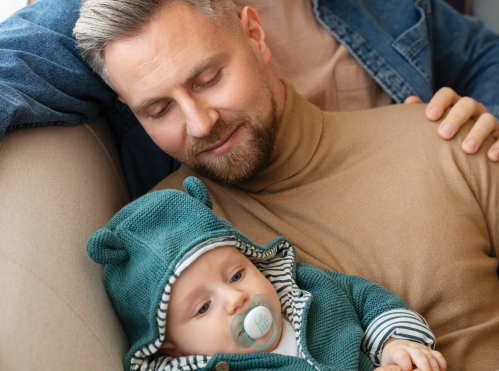Gay Dads Play an Essential Role as Both Mother and Father According to Neuroscience
By Brittany Berger
Raising children changes Gay Dads’ brains in the same way as biological mothers’ brains
Happy Father’s Day to all the Dads! Especially those who fill both parental roles in their household. Research finds that homosexual and adoptive dads take on more equal roles in raising their babies than heterosexual Fathers, meaning that in heteronormative couples it’s usually the mother that becomes the default parent while Gay Dads both become default parents. Brain studies done on parents confirms that Gay Dads experience the same brain changes as biological mothers who are default caregivers of their children, but Gay Dads also had the same brain changes as heterosexual fathers. Neuroscience confirms that Gay Dads are literally hard-wired to fill mothering and fathering. These findings highlight the profound biological groundworks of parental bonding and caregiving, challenging traditional notions of motherhood and fatherhood.
Parenthood induces significant changes in the brain, promoting the development of nurturing and caregiving behaviors. For a long time, research predominantly focused on biological mothers, linking these changes to pregnancy and childbirth. However, newer studies are expanding this understanding to include Fathers, particularly Gay and adoptive Fathers, whose experiences of parenthood do not involve the physical aspects of childbirth and breast/chestfeeding.
A groundbreaking study conducted by researchers at Bar-Ilan University in Israel, led by Dr. Ruth Feldman, provides compelling evidence of these brain changes. The study used functional magnetic resonance imaging (fMRI) to examine the brain activity of Gay Fathers, heterosexual Fathers, and biological mothers while they interacted with their children.
The study found that regardless of gender or biological connection, the brains of primary caregivers—whether mothers or fathers—undergo significant adaptation. This neuroplasticity is driven by the emotional and cognitive demands of parenting. Gay Dads, particularly those in dual-Father households where one partner assumes the primary caregiver role, exhibit brain activity patterns parallel to those of biological mothers.
Specifically, the research observed heightened activity in the amygdala, a region of the brain associated with emotional processing, in primary caregiver Fathers. This mirrors the activity seen in biological mothers, suggesting a shared neural mechanism strengthening parental bonding and caregiving. Further, the prefrontal cortex, responsible for executive functions and social cognition, also shows increased connectivity, emphasizing the complex nature of parental responsibilities.
The findings indicate that the brain’s adaptation to parenthood is not solely dependent on biological factors but is profoundly influenced by the caregiving environment and emotional investment. Gay Dads, who may face societal and psychological challenges, demonstrate an extraordinary capacity for emotional attunement and cognitive synchronization with their children.
In households where caregiving duties are equally shared, both Fathers show increased brain activity in regions associated with empathy and problem-solving. This suggests that the act of parenting itself, rather than inherent biological differences, promotes these brain changes. The flexibility and adaptability of the brain are central to understanding how different family structures can achieve similar outcomes in terms of child development and parental bonding.
Beyond neuroscience, this research gives valuable insights into child development and social constructs. Children raised by Gay Dads, adoptive parents, or in other non-traditional family structures benefit from the same neurobiological foundations of caregiving as those raised by biological mothers. This reinforces the importance of recognizing and supporting diverse family structures.
Future research should include a broader spectrum of parents, such as Transgender parents and single Fathers, to provide a more comprehensive understanding of the neurobiological aspects of parenting. Studies can be used to inform and promote inclusive practices and policies to support all parents, regardless of gender, sexual orientation, or biological connection to their children and babies.
The brain changes observed in Gay and adoptive Dads as they enter parenthood give light to the universality of the parenting experience. I love research that challenges traditional gender roles, and this research highlights the brain’s remarkable ability to adapt to the demands of caregiving. It’s about time the various ways in which individuals become parents is recognized and supported, to help all families have the opportunity to flourish. It’s clear that love, commitment, and the act of caregiving are the true foundations of effective parenting, exceeding biological and societal boundaries. So, again, Happy Father’s Day to all the Gay Dads and Happy Mother’s Day as well!

